Fleurs du Mal Magazine


Or see the index
« Ce livre n’est pas un livre de deuil. Le deuil, c’est après. […] La vivacité du présent. Celle du sentiment. La trace que nous laissons aux autres. Ces particules de temps et d’affection mêlés demeurent en suspens. Ici, ce sont elles qui commandent, et avec elles, le souffle que sa mort m’a laissé au cœur. »
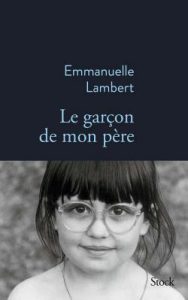
Le récit s’ouvre un dimanche de septembre 2019, un dimanche où le père « concret et nébuleux à la fois » d’Emmanuelle Lambert, se prépare à mourir d’un cancer de l’ampoule, un organe situé à la tête du pancréas.
Et pourtant, ce livre est un livre de vie. C’est que, par une douce ironie des mots, il est à l’image de ce personnage de père à la «chaleur explosive» : «rétif à toute forme de rêverie fatiguée, car dans la fatigue se glisse un effritement possible, une voie pour la douleur et le doute».
Le duo du livre-tombeau et du père illumine tout sur son passage. Il n’y a pas de gris ici, mais les couleurs éclatantes du souvenir, du mange-disques seventies aux yeux de Dalida.
Poignant et solaire, émouvant et lumineux, mélancolique sans le poids du pathos, familial et universel, le récit d’une fille raconte le père : mais le père aurait peut-être voulu un garçon.
À l’hyperactif soixante-huitard, au Dieu imprévisible de l’enfance, à l’ex-enfant triste qui joue jusqu’au bout de sa vie y compris en abordant aux rivages de la fin, répond une fille, qui se construit comme une femme. Avec une subtilité infinie, Emmanuelle Lambert traite dans ce livre de bien des thèmes, de l’intime au collectif, du masculin au féminin, et celle que son père, « le grand tonique » surnommait « Dudule », confirme l’écrivain de premier plan qu’elle est devenue.
Emmanuelle Lambert est l’auteure, entre autres, d’un roman, La Désertion (Stock, 2018), et d’un essai littéraire, Giono, furioso (Stock, 2019), couronné par le prix Femina de l’essai en 2019. Elle a été la commissaire de l’exposition Giono au Mucem, et vient d’éditer les romans et poèmes de Jean Genet dans la Pléiade.
Le garçon de mon père
Emmanuelle Lambert
Parution: 25/08/2021
Collection: Stock – La Bleue
180 pages
Format: 135 x 215 mm
EAN: 9782234090019
Prix: € 18.50
• fleursdumal.nl magazine
More in: - Book News, - Bookstores, Archive K-L, Archive K-L
Our Bodies, Their Battlefield: What War Does to Women by Christina Lamb
From Christina Lamb, the coauthor of the bestselling I Am Malala and an award-winning journalist—an essential, groundbreaking examination of how women experience war.
In Our Bodies, Their Battlefields, longtime intrepid war correspondent Christina Lamb makes us witness to the lives of women in wartime. An award-winning war correspondent for twenty-five years (she’s never had a female editor) Lamb reports two wars—the “bang-bang” war and the story of how the people behind the lines live and survive. At the same time, since men usually act as the fighters, women are rarely interviewed about their experience of wartime, other than as grieving widows and mothers, though their experience is markedly different from that of the men involved in battle.
 Lamb chronicles extraordinary tragedy and challenges in the lives of women in wartime. And none is more devastating than the increase of the use of rape as a weapon of war. Visiting warzones including the Congo, Rwanda, Nigeria, Bosnia, and Iraq, and spending time with the Rohingya fleeing Myanmar, she records the harrowing stories of survivors, from Yazidi girls kept as sex slaves by ISIS fighters and the beekeeper risking his life to rescue them; to the thousands of schoolgirls abducted across northern Nigeria by Boko Haram, to the Congolese gynecologist who stitches up more rape victims than anyone on earth. Told as a journey, and structured by country, Our Bodies, Their Battlefields gives these women voice.
Lamb chronicles extraordinary tragedy and challenges in the lives of women in wartime. And none is more devastating than the increase of the use of rape as a weapon of war. Visiting warzones including the Congo, Rwanda, Nigeria, Bosnia, and Iraq, and spending time with the Rohingya fleeing Myanmar, she records the harrowing stories of survivors, from Yazidi girls kept as sex slaves by ISIS fighters and the beekeeper risking his life to rescue them; to the thousands of schoolgirls abducted across northern Nigeria by Boko Haram, to the Congolese gynecologist who stitches up more rape victims than anyone on earth. Told as a journey, and structured by country, Our Bodies, Their Battlefields gives these women voice.
We have made significant progress in international women’s rights, but across the world women are victimized by wartime atrocities that are rarely recorded, much less punished. The first ever prosecution for war rape was in 1997 and there have been remarkably few convictions since, as if rape doesn’t matter in the reckoning of war, only killing. Some courageous women in countries around the world are taking things in their own hands, hunting down the war criminals themselves, trying to trap them through Facebook.
In this profoundly important book, Christina Lamb shines a light on some of the darkest parts of the human experience—so that we might find a new way forward. Our Bodies, Their Battlefields is as inspiring and empowering is as it is urgent, a clarion call for necessary change.
Christina Lamb is one of Britain’s leading foreign correspondents and a bestselling author. She has reported from most of the world’s hotspots starting with Afghanistan after an unexpected wedding invitation led her to Karachi in 1987 when she was just 22. She moved to Peshawar to cover the mujaheddin fighting the Soviet Union and within two years she had been named Young Journalist of the Year. Since then she has won 15 major awards including five times being named Foreign Correspondent of the Year and Europe’s top war reporting prize, the Prix Bayeux. She was made an OBE by the Queen in 2013 and is an honorary fellow of University College, Oxford.
Our Bodies, Their Battlefield:
What War Does to Women
by Christina Lamb
Publisher: William Collins
5 Mar. 2020
Language: English
Hardcover: 432 pages
ISBN-10: 0008300003
ISBN-13: 978-0008300005
£14.99
• fleursdumal.nl magazine
More in: - Book Stories, - Bookstores, Archive K-L, Feminism, MONTAIGNE, WAR & PEACE
New and selected poets from the
great Pulitzer Prize–winning poet
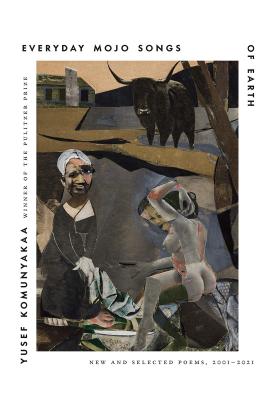
Everyday Mojo Songs of Earth brings together selected poems from the past twenty years of Yusef Komunyakaa’s work, as well as new poems from the Pulitzer Prize winner.
Komunyakaa’s masterful, concise verse conjures arresting images of peace and war, the natural power of the earth and of love, his childhood in the American South and his service in Vietnam, the ugly violence of racism in America, and the meaning of power and morality.
The new poems in this collection add a new refrain to the jazz-inflected rhythms of one of our “most significant and individual voices” (David Wojahn, Poetry).
Komunyakaa writes of a young man fashioning a slingshot, workers who “honor the Earth by opening shine / inside the soil,” and the sounds of a saxophone filling a dim lounge in New Jersey. As April Bernard wrote in The New York Times Book Review, “He refuses to be trivial; and he even dares beauty.”
These songs run along dirt roads
& highways, crisscross lonely seas
& scale mountains, traverse skies
& underworlds of neon honkytonk,
Wherever blues dare to travel.
Yusef Komunyakaa (born James William Brown, April 29, 1941) is an American poet who teaches at New York University and is a member of the Fellowship of Southern Writers. Komunyakaa is a recipient of the 1994 Kingsley Tufts Poetry Award, for Neon Vernacular and the 1994 Pulitzer Prize for Poetry. He also received the Ruth Lilly Poetry Prize. Komunyakaa received the 2007 Louisiana Writer Award for his enduring contribution to the poetry world. His subject matter ranges from the black experience through rural Southern life before the Civil Rights era and his experience as a soldier during the Vietnam War.
Everyday Mojo Songs of Earth:
New and Selected Poems, 2001-2021
by Yusef Komunyakaa
Publisher: Farrar, Straus and Giroux
(June 15, 2021)
Language: English
288 pages
ISBN-10 : 0374600139
ISBN-13 : 978-0374600136
Hardcover $25.60
Paperback $18.00
• fleursdumal.nl magazine
More in: #Editors Choice Archiv, - Book News, - Bookstores, Archive K-L, Archive K-L, Black Lives Matter
Four Quartets: Poetry in the Pandemic by Jeffrey Levine (Author, Editor), Kristina Marie Darling (Author, Editor). Praised as “an extraordinary bardic chant and threnody for humanity,” Four Quartets is a transcendent and ultimately transformative book of poetry written through the COVID-19 pandemic.
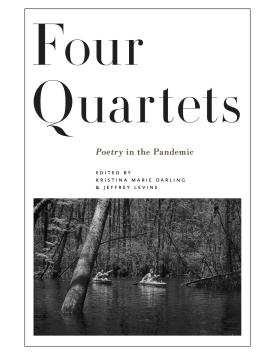 In this timely anthology, established and emerging poets bear powerful witness to the COVID-19 pandemic in writing that reels from collective grief and uncertainty. This volume consists of sixteen separate chapbooks, and a collection of pandemic-era photography, which are unified by a shared narrative: public and private experiences of quarantine, and the impulse toward creation during a time of enormous upheaval, injustice, and protest.
In this timely anthology, established and emerging poets bear powerful witness to the COVID-19 pandemic in writing that reels from collective grief and uncertainty. This volume consists of sixteen separate chapbooks, and a collection of pandemic-era photography, which are unified by a shared narrative: public and private experiences of quarantine, and the impulse toward creation during a time of enormous upheaval, injustice, and protest.
Each voice brings with it a deeply personal account of this globally historic moment, and in doing so, conveys the urgency of introspection, of isolation, and of revolution.
These pieces feature B. A. Van Sise, Jimmy Santiago Baca, Yusef Komunyakaa, Laren McClung, Stephanie Strickland, Mary Jo Bang, Shane McCrae, Ken Chen, J. Mae Barizo, Dora Malech, Jon Davis, Lee Young-Ju, Jae Kim, Rachel Eliza Griffiths, A. Van Jordan, Maggie Queeney, Traci Brimhall, Brynn Saito, Denise Duhamel, and Rick Barot.
Kristina Marie Darling is the author of over twenty books of poetry. Her awards include two Yaddo residencies and a Hawthornden Castle Fellowship, as well as grants from the Whiting Foundation and Harvard University’s Kittredge Fund. She has twice been appointed as a Visiting Artist at the American Academy in Rome. Her poems and essays appear in The Gettysburg Review, New American Writing, The Mid-American Review, Third Coast, The Columbia Poetry Review, Verse Daily, and elsewhere.
Four Quartets: Poetry in the Pandemic
by Kristina Marie Darling & Jeffrey Levine
Publisher: Tupelo Press (November 25, 2020)
Language: English
296 pages
ISBN-10: 1946482455
ISBN-13: 978-1946482457
Paperback $25.95
Hardcover $39.95
• fleursdumal.nl magazine
More in: #Editors Choice Archiv, #More Poetry Archives, Archive C-D, Archive C-D, Archive K-L, Archive K-L
Joanna Klink‘s fifth book begins with poems of personal loss–a tree ripped out by a windstorm, a friendship broken off after decades, the nearing death of parents.
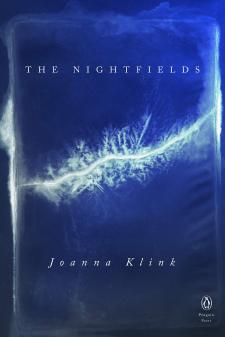 Other poems take on the cost of not loving fully, or are written from bewilderment at the accumulation of losses and at the mercilessness of having, as one ages, to rule things out. There are elegies for friends, and a group of devotional poems.
Other poems take on the cost of not loving fully, or are written from bewilderment at the accumulation of losses and at the mercilessness of having, as one ages, to rule things out. There are elegies for friends, and a group of devotional poems.
The Nightfields closes with thirty-one metaphysical poems inspired by the artist James Turrell’s Roden Crater, an extinct volcano in Arizona that Turrell has been transforming into an observatory for the perception of time. The sequence unfolds as a series of revelations that begin in psychic fear and move gradually toward the possibility of infinitude and connection.
Joanna Klink is the author of five books of poetry. She has received awards and fellowships from the Rona Jaffe Foundation, Jeannette Haien Ballard, Civitella Ranieri, the Bogliasco Foundation, the American Academy of Arts and Letters, the Trust of Amy Lowell, and the John Simon Guggenheim Memorial Foundation. She is teaching at the Michener Center in Austin. Her most recent book, The Nightfields, was published July 7, 2020 by Penguin Books.
( . . . )
When the wind pushes
branches in and out of
shade it is an opening,
as every small gesture
toward another person is
incomprehensibly alive.
Will you be part of the
stoneless passage?
( . . . )
A new collection from a poet whose books “are an amazing experience: harrowing, ravishing, essential, unstoppable” (Louise Glück)
The Nightfields
by Joanna Klink (Author)
Publisher: Penguin Books
July 7, 2020
Language: English
Paperback: 112 pages
ISBN-10: 0143135392
ISBN-13: 978-0143135395
Price: $20.00
• fleursdumal.nl magazine
More in: #Editors Choice Archiv, - Book News, - Bookstores, Archive K-L, Archive K-L
« J’ai appris à connaître toutes les pierres de la rivière. J’ai compris que ces pierres n’ont pas besoin d’apprendre à me connaître ; que la nature n’a pas besoin de moi. Que moi seule ai besoin d’elle. »
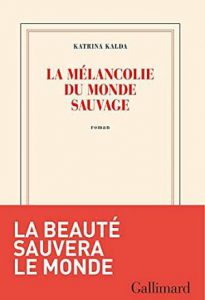 Rien ne destinait Sabrina à une carrière artistique. Élevée par une mère fragile dans un milieu modeste, elle a peu de perspectives d’avenir.
Rien ne destinait Sabrina à une carrière artistique. Élevée par une mère fragile dans un milieu modeste, elle a peu de perspectives d’avenir.
Jusqu’au jour où, lors de la visite scolaire du musée Rodin, elle découvre sa vocation : elle consacrera sa vie à l’art. Dès lors, Sabrina se voue totalement à ce projet. La précarité étudiante est vite compensée par les amitiés fortes et la richesse des recherches artistiques. Mais les soubresauts de sa vie amoureuse et les bouleversements d’un monde dont l’effondrement semble inéluctable ne tardent pas à infléchir sa trajectoire.
À travers le destin d’une artiste contemporaine, Katrina Kalda interroge la place de l’art dans un univers en crise. Son écriture, harmonieuse et assurée, soutient ce roman plein d’émotions.
Katrina Kalda
La mélancolie du monde sauvage
Littérature française
Romans et récits
ISBN : 9782072925344
EAN : 9782072925344
280 pages
Éditeur: Gallimard
06/05/2021
140 x 205 mm
€ 20,00
• fleursdumal.nl magazine
More in: - Book Lovers, - Book Stories, Archive K-L, Auguste Rodin, Camille Claudel, Sculpture
As this urgent, genre-defying book opens, a woman who has recently been elevated to prominence for her social media posts travels around the world to meet her adoring fans.
 She is overwhelmed by navigating the new language and etiquette of what she terms “the portal,” where she grapples with an unshakable conviction that a vast chorus of voices is now dictating her thoughts. When existential threats—from climate change and economic precariousness to the rise of an unnamed dictator and an epidemic of loneliness—begin to loom, she posts her way deeper into the portal’s void.
She is overwhelmed by navigating the new language and etiquette of what she terms “the portal,” where she grapples with an unshakable conviction that a vast chorus of voices is now dictating her thoughts. When existential threats—from climate change and economic precariousness to the rise of an unnamed dictator and an epidemic of loneliness—begin to loom, she posts her way deeper into the portal’s void.
An avalanche of images, details, and references accumulate to form a landscape that is post-sense, post-irony, post-everything. “Are we in hell?” the people of the portal ask themselves. “Are we all just going to keep doing this until we die?”
Suddenly, two texts from her mother pierce the fray: “Something has gone wrong,” and “How soon can you get here?” As real life and its stakes collide with the increasingly absurd antics of the portal, the woman confronts a world that seems to contain both an abundance of proof that there is goodness, empathy, and justice in the universe, and a deluge of evidence to the contrary.
Fragmentary and omniscient, incisive and sincere, No One Is Talking About This is at once a love letter to the endless scroll and a profound, modern meditation on love, language, and human connection from a singular voice in American literature.
Patricia Lockwood is the author of a novel, No One Is Talking About This; a memoir, Priestdaddy; and two poetry collections, Motherland Fatherland Homelandsexuals and Balloon Pop Outlaw Black. Her writing has appeared in the New Yorker, the New York Times, and the London Review of Books, where she is a contributing editor. Her works have been selected for series such as the Best American Essays, the Best American Poetry, and the Norton Anthology of American Literature. She lives in Savannah, Georgia.
No One Is Talking About This
by Patricia Lockwood
Novel
February 16, 2021
Publisher: Riverhead Books
Language: English
Hardcover
224 pages
ISBN-10: 0593189582
ISBN-13: 978-0593189580
$22.49
LONGLISTED FOR THE 2021 BOOKER PRIZE
FINALIST FOR THE WOMEN’S PRIZE
LONGLISTED FOR THE CENTER FOR FICTION FIRST NOVEL PRIZE
• fleursdumal.nl magazine
More in: - Book News, - Bookstores, Archive K-L
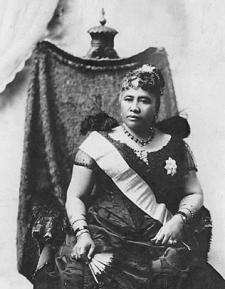
Kumulipo
(Hawaiian creation chant)
At the time that turned the heat of the earth,
At the time when the heavens turned and changed,
At the time when the light of the sun was subdued
To cause light to break forth,
At the time of the night of Makalii (winter)
Then began the slime which established the earth,
The source of deepest darkness.
Of the depth of darkness, of the depth of darkness,
Of the darkness of the sun, in the depth of night,
It is night,
So was night born
Kumulipo
O ke au i kahuli wela ka honua
O ke au i kahuli lole ka lani
O ke au i kukaiaka ka la.
E hoomalamalama i ka malama
O ke au o Makali’i ka po
O ka walewale hookumu honua ia
O ke kumu o ka lipo, i lipo ai
O ke kumu o ka Po, i po ai
O ka lipolipo, o ka lipolipo
O ka lipo o ka la, o ka lipo o ka po
Po wale hoi
Hanau ka po
Queen Liliʻuokalani
(1838-1917)
Kumulipo
Hawaiian creation chant
• fleursdumal.nl magazine
Queen Liliʻuokalani was born on September 2, 1838 in Honolulu, Hawaii, as Lydia Kamakaeha. She was proclaimed queen in 1891. The last monarch of Hawaii, her reign was short-lived due to a U. S. military-backed coup in 1893.
More in: # Classic Poetry Archive, Archive K-L, Archive K-L
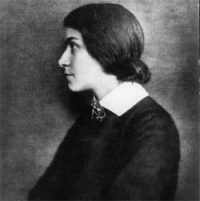
Mein blaues Klavier
Ich habe zu Hause ein blaues Klavier
Und kenne doch keine Note.
Es steht im Dunkel der Kellertür,
Seitdem die Welt verrohte.
Es spielten Sternenhände vier
-Die Mondfrau sang im Boote-
Nun tanzen die Ratten im Geklirr.
Zerbrochen ist die Klaviatür…..
Ich beweine die blaue Tote.
Ach liebe Engel öffnet mir
-Ich aß vom bitteren Brote-
Mir lebend schon die Himmelstür-
Auch wider dem Verbote.
Else Lasker-Schüler
(1869 – 1945)
Mein blaues Klavier
• fleursdumal.nl magazine
More in: Archive K-L, Archive K-L, Lasker-Schüler, Else
From the Number One Sunday Times bestselling author of milk and honey and the sun and her flowers comes her greatly anticipated third collection of poetry.

Rupi Kaur constantly embraces growth, and in home body, she walks readers through a reflective and intimate journey visiting the past, the present and the potential of the self. home body is a collection of raw, honest conversations with oneself – reminding readers to fill up on love, acceptance, community, family, and embrace change. illustrated by the author, themes of nature and nurture, light and dark, rest here.
i dive into the well of my body
and end up in another world
everything i need
already exists in me
there’s no need
to look anywhere else
– home
rupi kaur is a poet. artist. and performer. as a 21-year-old university student rupi wrote. illustrated. and self-published her first poetry collection milk and honey. next came its artistic sibling the sun and her flowers. these collections have sold over 8 million copies and have been translated into over 40 languages. home body is her third collection of poetry. rupi’s work touches on love. loss. trauma. healing. femininity. and migration. she feels most at home when creating art or performing her poetry onstage.
Rupi Kaur
Home Body
Paperback
ISBN : 9781471196720
Publisher: Simon & Schuster UK
November 17, 2020
English Poetry
$13.59
# new poetry
Rupi Kaur
Home Body
• fleursdumal.nl magazine
More in: - Book News, Archive K-L, Archive K-L, Art & Literature News, Kaur, Rupi

Versöhnung
Es wird ein großer Stern in meinen Schoß fallen …
Wir wollen wachen die Nacht,
In den Sprachen beten,
Die wie Harfen eingeschnitten sind.
Wir wollen uns versöhnen die Nacht –
So viel Gott strömt über.
Kinder sind unsere Herzen,
Die möchten ruhen müdesüß.
Und unsere Lippen wollen sich küssen,
Was zagst du?
Grenzt nicht mein Herz an deins –
Immer färbt dein Blut meine Wangen rot.
Wir wollen uns versöhnen die Nacht,
Wenn wir uns herzen, sterben wir nicht.
Es wird ein großer Stern in meinen Schoß fallen.
Else Lasker-Schüler
(1869 – 1945)
Versöhnung
• fleursdumal.nl magazine
More in: Archive K-L, Archive K-L, Lasker-Schüler, Else
Going Down Grand, the first full-length anthology of Grand Canyon poetry, gathers the voices of cowboys, explorers, river-runners, hikers, artists, geologists, rangers, and others whose words bear witness to this complex and magnificent place.
 For readers on the river, the trails, the rim, or beyond, the poems on these pages will make fine canyon company.
For readers on the river, the trails, the rim, or beyond, the poems on these pages will make fine canyon company.
GOING DOWN GRAND, the first full length anthology of Grand Canyon poems, gathers the voices and thoughts of explorers, cowboys, river-runners, hikers, artists, geologists, rangers, and others whose words reveal and bear witness to this complex and magnificent place. For readers on the river, the trails, the rim, or beyond, the poems on these pages will make fine canyon company.
Co-editor Rick Kempa has been hiking in and writing about the Grand Canyon since 1974. He is also editor of the anthology ON FOOT: Grand Canyon Backpacking Stories (Vishnu Temple Press, 2014) and has authored two books of poems, Keeping the Quiet and Ten Thousand Voices.
Rick Kempa (M.F.A. U of Arizona) teaches writing and philosophy at Western Wyoming College. His work has appeared in Puerto del Sol, High Plains Literary Review, Teaching English in the Two-Year College and Tumblewords: Writers Reading the West (U of Nevada P, 1995).
Going Down Grand: Poems from the Canyon
Edited by Peter Anderson & Rick Kempa
2015
Publisher: Lithic Press
Product Number:9780988384651
ISBN0988384655
Binding: Paperback
Pages:148
Price: $ 17.00
# new books
Going Down Grand: Poems from the Canyon
Edited by Peter Anderson & Rick Kempa
• fleursdumal.nl magazine
More in: #More Poetry Archives, - Book News, Archive K-L, Cowboy Poetry, Natural history, Western Fiction, Western Non-Fiction
Thank you for reading Fleurs du Mal - magazine for art & literature